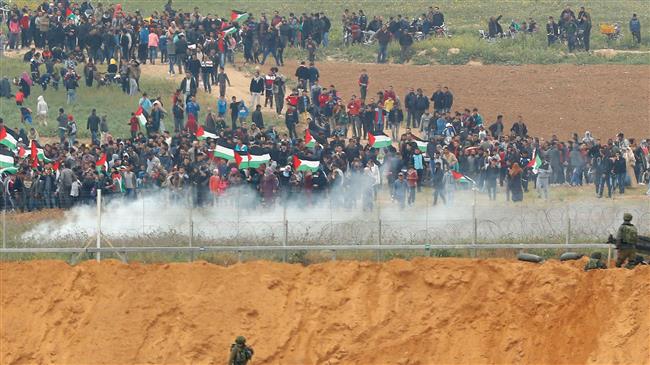
RNA - Palestinian journalists are also among many persons in administrative detention, Israel's British-colonial-era practice of imprisoning Palestinians indefinitely without charge or trial. These unfortunate journalists are being targeted due to their efforts to document Israeli violations, including its practices of land confiscation, targeted assassination, violent crackdowns, and so on.
At least 10 Palestinian journalists, for instance, were injured while covering mass protests on the Gaza border last week, according to the Palestinian Journalists Syndicate (PJS), the Palestinian press freedom group Palestinian Center for Development and Media Freedom (MADA), the regional press freedom group Center for Defending the Freedom of Journalists (CFJ), and news reports, including those by Human Rights Watch.
Thousands of Palestinians joined the protest in the Gaza Strip on March 30 against Israel’s refusal to allow Palestinian refugees to return to their pre-1948 homes, news reports say. At least 18 Palestinians have been killed and 1,400 injured in the protest. This is while under International Law, journalists should be able to cover demonstrations without fearing for their safety. Meaning, Israeli troops who commit violence against journalists and violate the laws of war by targeting civilian objects can be held to account.
The Israeli regime asserts that each of the attacks against Palestinian journalists was on a legitimate military target but provides no specific information to support its claims. After examining the attack sites and interviewing witnesses, Human Rights Watch has found no indications that these media targets were valid military objectives.
In the words of Sarah Leah Whitson, Middle East director at Human Rights Watch: Just because Israel says a journalist was a fighter or a TV station was a command center does not make it so. Journalists who praise Hamas and TV stations that applaud attacks on Israel may be propagandists, but that does not make them legitimate targets under the laws of war.
According to Fars News Agancy, Israeli officials further seek to justify attacks on Palestinian media by saying the military has targeted individuals or facilities that “had relevance to or were linked with a Palestinian armed group, or had encouraged and lauded acts of terror against Israeli civilians.” These justifications, suggesting that it is permissible to attack media because of their associations or opinions, however repugnant, rather than their direct participation in hostilities, still violate the laws of war and place journalists at grave risk, that’s again according to Human Rights Watch. Moreover, official statements that reflect the usurper regime’s military having adopted an unlawful basis for attacks are evidence of war crimes because they show intent.
Under International Humanitarian Law, or the laws of war, Palestinian journalists and media workers covering the Land Day protests in Gaza are civilians and therefore immune from attack unless they are directly participating in armed hostilities. Television and radio stations are civilian objects protected from Israeli attack unless they are used to make an “effective contribution to military action” and their destruction in the specific circumstances offers “a definite military advantage.”
For example, a radio station that is used to transmit military orders would be a legitimate military target. Broadcasts intended to improve civilian morale in peaceful protest or express support for protests are not considered direct participation in hostilities. Besides, all those who are protesting along the Gaza border are unarmed and the targeted journalists were not Hamas fighters or otherwise directly participating in the hostilities. Simply put, they were doing their jobs, in this case reporting from the ground, and were not in any way directly taking part in military operations.
In summation, and under the laws of war, civilians and civilian structures may not be deliberate targets of attack. Just as it is unlawful to attack the civilian population to lower its morale during anti-occupation protests, it is unlawful to attack journalists and media facilities that shape public opinion - neither directly contributes to military operations. International Law further obligates United Nations member states to investigate serious violations of the laws of war by Israeli forces in this particular case.
At a time when Human Rights Watch says it saw nothing during the peaceful protests in Palestinian journalists that suggested they were members of any armed group, those Israeli officials and forces responsible for deliberately or recklessly ordering and committing the serious violation of the laws of war against Palestinian journalists can and should be prosecuted for war crimes. The same legal argument could be made against Israeli targeting of unarmed Palestinians during the Land Day protests.
847/940